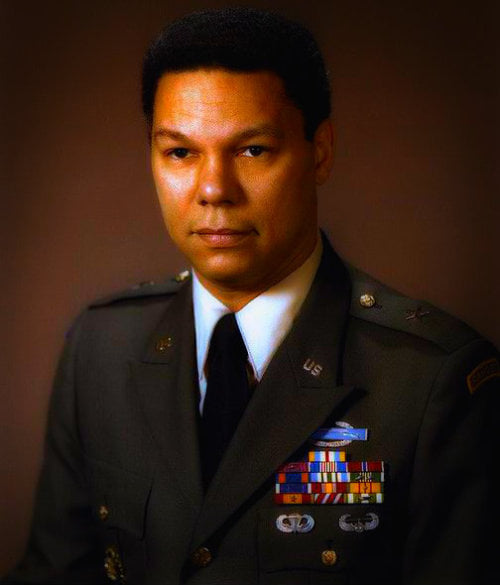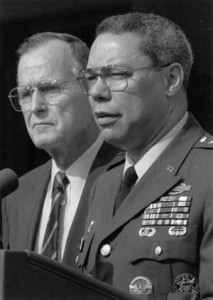
In the year 1987, Powell, then an Army Lieutenant General, became Ronald Reagan’s National Security Advisor following the Iran-Contra Affair. In 1989, Colin left his position as National Security Advisor, and under the George H.W. Bush administration, he was made a four-star general. He then went on to serve as Commander in Chief, Forces Command. During this post, he oversaw all Army, Army Reserve, and National Guard units in continental U.S., Alaska, Hawaii, and Puerto Rico. His tenure in this post was very brief before President George H.W. Bush selected him as Chairman of the Joint Chiefs of Staff.
On October 1, 1989, at the age of fifty-two Powell became the first Afro-Caribbean American as well as the youngest officer to become Chairman of the Joint Chiefs of Staff. Throughout his time as Chairman of the Joint Chiefs of Staff, he oversaw many crises some of which include the Invasion of Panama (1989) and Operation Desert Storm which was a part of the Persian Gulf War in 1991. During his tenure, his use of overwhelming force in military operations to maximize the potential for success and reduce the number of casualties became known as the “Powell Doctrine”.
The Powell Doctrine is a military strategy that states the U.S. should only use military force as a last resort, and when doing so, it must commit with clear objectives, overwhelming force, broad public support, and a definitive exit strategy. The doctrine was shaped largely by the U.S. experience in the Vietnam War, which was seen as a cautionary tale of intervention without a clear mission or decisive use of force.
Core components
The doctrine is based on a series of questions that must be answered affirmatively before the U.S. engages in military action. These include whether vital national security interests are threatened, if there is a clear and attainable objective, a thorough analysis of risks and costs, the exhaustion of non-violent options, a plausible exit strategy, consideration of consequences, and broad domestic and international support for the action.
Application: The Gulf War vs. the Iraq War
The Gulf War (1990–1991) is often seen as a successful application of the Powell Doctrine, with its use of overwhelming force, international support, and a clear exit strategy. Conversely, the 2003 invasion of Iraq is viewed as a departure from the doctrine, characterized by unclear objectives, questionable intelligence presented to the UN (which Powell later regretted), and a lack of planning for the post-invasion phase, leading to a prolonged insurgency.
Powell Doctrine vs. Rumsfeld Doctrine
The 2003 Iraq invasion also highlighted the difference between the Powell Doctrine and the approach favored by then-Secretary of Defense Donald Rumsfeld. Rumsfeld advocated for a smaller, more agile force focused on speed and technology, which proved effective initially but insufficient for the subsequent counterinsurgency, demonstrating the risks the Powell Doctrine aimed to avoid.
Legacy and relevance today
The Powell Doctrine continues to influence U.S. national security discussions, particularly in light of the protracted conflicts in the Middle East. Following Powell’s death in 2021, commentary noted that the challenging experiences in Iraq and Afghanistan have led to a renewed appreciation for the more cautious principles of the doctrine in foreign policy debates.
Throughout his tenure, he very infrequently advocated for military intervention for international crisis; he usually advocated for democracy and containment. Initially, Powell stayed on as Chairman during President Bill Clinton’s administration however, he ultimately left the position on September 30, 1993, because he thought he was a bad fit in an administration made up of most liberals. During his tenure, there was talk about granting him a fifth star which in turn would have made him General of the Army. However, even though Congress and the public pressured it, Bill Clinton’s presidential transition team decided against it.

